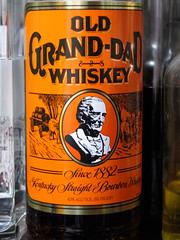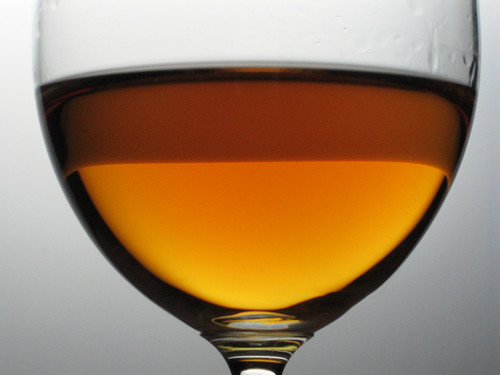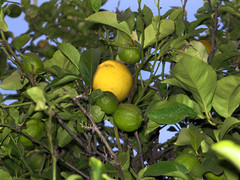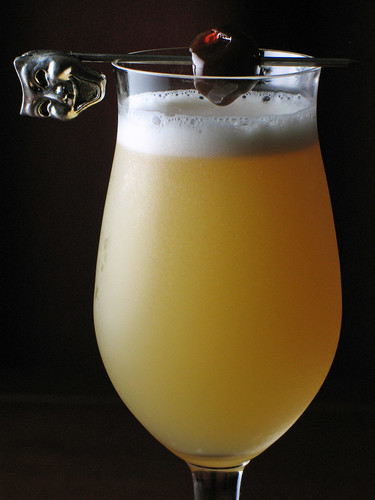Matt Rowley is hosting MxMo this month, and his chosen theme reflects our economic hard times as well as heis own — he got laid off recently (eep!). Liquor, as we know, isn’t cheap (not the good stuff,  at least), and Matt wrote a wonderful post on taking stock of your liquor cabinet and making do with what you have on hand. This is good advice in general, not just for hard times.
at least), and Matt wrote a wonderful post on taking stock of your liquor cabinet and making do with what you have on hand. This is good advice in general, not just for hard times.
I should probably do what he suggests. I have a general idea of where everything is, kinda sorta how much of it, but we’ve got an insanely big bar — hundreds of bottles — that it can get away from me. A regular dusting and once-over is a terrific idea (organizing all our stuff wouldn’t be bad, either).
Wesly and I have been lucky — neither of us has been laid off, and we’re pretty safe at our respective jobs (it helps to be considered indispensible; it gets annoying when they give you a hard time about taking time off —  “Whatever shall we do without you?!” — but that translates into job security). We haven’t had to take a hard look at doing anything like not-buying liquor, but that doesn’t mean that we can’t be frugal.
“Whatever shall we do without you?!” — but that translates into job security). We haven’t had to take a hard look at doing anything like not-buying liquor, but that doesn’t mean that we can’t be frugal.
Matt found a great bargain in Bulleit Bourbon, one that I like a lot as well, a mere $19.99 at Trader Joe’s. You can get a decent Bourbon for even less than that, and for that we turn to our old friend and relative … Old Grand-Dad.
I can hear some of you now. “Bottom shelf!” is one cry from the back benches. Well, true, it does have a bottom shelf price — we get it at Beverage Warehouse for a whopping $9.95. Don’t be fooled by the low price, though. While it’s not exactly one I’d choose for sipping straight (although that’s certainly doable), it mixes very well, especially in one particular favorite that doesn’t get as much attention as it deserves. More on that in a bit.
Old Grand-Dad is a venerable brand, dating back to 1882 and was initially made by the Wathen family distillery (who also owned The American Medicinal Spirits Company, who produced some very much-needed medicine during Prohibition).
I’d read a number of reports that Old Grand-Dad was significantly better when it was made by National Distillers before 1987. Using the Google revealed a number of comments along the lines of, “My grandparents used to drink this stuff.” In ’87 the brand was sold to Jim Beam, and many folks have said it’s not what it once was. I can’t say, as I don’t recall having tasted it straight prior to the change in ownership, nor was my childhood palate able to discern much of anything. The word is, though, that if you come across a vintage bottle you should snap it up. (Odd bit of trivia: the portrait of the grand-dad on the label is Basil Hayden, a renowned distiller in the 18th and 19th Centurues whose picture doesn’t appear on the label of the Beam-made small batch whiskey that’s actually named after him.) “Bottom shelf” is more of a reflection of its price, but flavor-wise, at least for mixing, it’s better than that. There’s also a bonded version (100 proof by law) that’s even better, but with a higher price, and I’ve seen a 114 proof version but haven’t tried that one as yet.
As my sipping Bourbons tend toward the higher-end stuff, I realized I had never actually tasted Old Grand-Dad neat. I decided to pour a shot of the regular 86 proof product into our lovely Riedel Bourbon glasses to give the straight stuff a sniff and a sip, and see what we’re up to here.

Nice color, with caramel, oak and a little vanilla on the nose, plus a touch of spice from the rye content in the mash. More caramel and vanilla and oak on the palate, and a significant amount of alcohol heat but not too bad, long finish. Not my first choice for a sipping whiskey by any means, but certainly sippable, especially on the rocks. Best of all, for $9.95 per 750ml bottle it’s a significant bargain if Buffalo Trace, Maker’s Mark or Bulleit (all bargains themselves) are still stretching the budget too far.
All that to say, while it’s drinkable straight it’s far better when mixed, and Wes and I tended to keep it around primarily for one drink of which we’re rather fond — the venerable Whiskey Sour.
Along with the Old Fashioned, this was one of the main drinks I grew up around and was one of my dad’s favorites (along with what the family called a “Highball,” consisting of Seagram’s V.O. and 7UP). It was the one I tended to get sips of most often, and is underrated by a lot of cocktail folks, I think. Very refreshing, very tasty, a classic. And Old Grand-Dad makes mighty fine Whiskey Sours. You don’t really need a high-end Bourbon for these, although you certainly could if you wanted and if you can afford it. But in keeping with tough times, this $9.95 whiskey is really all you need.
Simple syrup for your cocktails is cheap to make too, just a cup of sugar to a cup of water, and shake the hell out of it until it’s dissolved (and a splash of vodka as a preservative). I wanted something a bit more complex than a regular sour, though, so given the Carnival season in full swing I decided to pull this drink out again. I’ve posted it before (and to my chagrin I note that I posted it only four months ago … I really do have no proper sense of the passage of time), but it’s a good example of cocktail frugality, if not quite as frugal as the Whiskey Sour. In case you missed it the last time I posted it, here’s the Falernum recipe I use:
Falernum No. 10
(by Paul Clarke)
6 ounces Wray & Nephew Overproof White Rum (63% abv).
Zest of 9 limes, preferably organic.
50 cloves, toasted.
2 tablespoons blanched slivered almonds, toasted.
1/2 tsp almond extract.
1-1/2 ounces fresh ginger, peeled and julienned.
14 ounces rich (2:1) simple syrup, cold preparation.
Zest the limes carefully with a microplane grater, zester or vegetable peeler, making sure to leave all the white pith behind. Toast the cloves in a dry skillet over medium heat, shaking frequently, just until they begin to become aromatic, then remove from heat. Toast the almonds, shaking frequently, until they begin to turn light brown, then remove from heat. Add the lime zest, cloves, almonds and ginger to the rum in a pint-sized jar and allow to infuse for 24 hours, shaking occasionally. Strain the infusion through moistened cheesecloth, and squeeze to get every drop of liquid out. Filter if necessary.
To make the simple syrup, add 2 cups sugar and 1 cup cold water to a large jar. Seal the lid and shake like hell until the sugar is completely dissolved. (C’mon, you need the workout.) Measure 14 ounces of syrup (you’ll have a little extra); add the rum infusion to the syrup and shake to combine. Store in refrigerator.
I did finally remember where I got this recipe — a site called Mr. Lucky, which has a small cocktail section (which doesn’t seem to have been updated in ages). They came up with the idea of replacing the simple syrup in a Whiskey Sour with falernum, giving the drink a more complex and brighter flavor profile and a nice dose of the Caribbean (New Orleans being the northernmost Caribbean port, as some say). I did a  little tweaking of the original recipe and added the egg white for the nicer body and frothy head you get in a proper sour.
little tweaking of the original recipe and added the egg white for the nicer body and frothy head you get in a proper sour.
The final bit of frugality for this drink was picking a free lemon off the tree in our front yard (which is bearing beautifully even in mid-February; I love fruit trees that bear all year long). It astonishes me to go into a big chain supermarket like Ralph’s and see lemons selling for anywhere from 79¢ to 99¢ APIECE. What absurd price-gouging. At the smaller Latino markets in Highland Park near where we live, or even at the Super A supermarket, lemons tend to go for 99¢ a pound or less; limes are often selling for 3 pounds for 99¢. Do your best to find small produce markets in your neighborhood — this is a good idea for most of your produce, not just for the citrus. We find fantastic quality stuff for a fraction of what you pay at the supermarket. Local farmer’s markets are also a great value. Even better … I’d strongly urge any cocktail fans to plant one lemon and one lime tree if they have room for it. A regular supply of free citrus for your drinks is a very good thing. And if you’re actually paying nearly a buck PER lemon, the tree will pay for itself very quickly.
So, apologies if you feel this is a rerun, but you really should try it if you haven’t already.

Mardi Gras Sour
(Adapted from Mr. Lucky’s Cocktails)
2 ounces Old Grand-Dad Bourbon whiskey.
1 ounce fresh lemon juice.
3/4 ounce Falernum No. 10.
1 teaspoon egg white.
Combine with ice in a cocktail shaker and shake like hell until the shaker’s so cold it hurts. Strain into a sour glass or some kind of pretty stemmed glass (about 5 oz.), and garnish with a proper brandied (or preferably whiskied) cherry.
The cost of the whiskey in this drink? About 79¢. The cost of the falernum … um, too much math, but I’m guessing about 40¢. The lemon? FREE! (My favorite price! Free food from your yard, yay!) Enjoy this drink for about $1.19.
It’s nice to serve these in a pretty sour glass, but I could really go for a double-size one of these on the rocks in a go-cup on a parade route. Speaking of which, if you’re sipping one of these and missing Mardi Gras and the parade season leading up to it, you can get the next best thing to being there. Fix yourself a Mardi Gras Sour, order a King Cake from Randazzo’s, put on some great New Orleans music and … um, throw some beads up in the air and catch them. (Extra points if you stomp on your own hand or knock over one of your own children to get them.)
and … um, throw some beads up in the air and catch them. (Extra points if you stomp on your own hand or knock over one of your own children to get them.)

 at least), and Matt wrote a
at least), and Matt wrote a 







